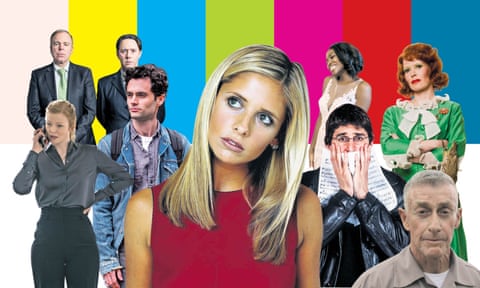Over the coming weeks more and more of us will find ourselves unable to leave home. With live TV shutting down, no sport, and even the soaps likely to shut up shop, here is our writers’ guide to the top 50 shows to get your teeth into. These may not be the most intellectually demanding programmes of all time, but they are the ones you won’t be able to tear yourself away from. Let us know your favourites to binge in the comments.
1
Buffy the Vampire Slayer
Amazon
High school is hell. US teen dramas have been telling us that ever since new-girl Brenda first nervously clutched a textbook to her chest in Beverly Hills, 90210. It was Buffy Summers, though, who made it thrillingly literal. Played by Sarah Michelle Gellar, she looked like an ordinary, perky teen, which is exactly what she wanted to be. Sadly, when your hometown is located directly over a hellmouth, maintaining some semblance of normality is a challenge.
Buffy was the Slayer, chosen by fate to battle each season’s Big Bad and, at least once a semester, save the world. Yet, in one of her many rebellions against ancient lore, she refused to work alone. She had guidance from her Watcher, the school librarian Rupert Giles (Anthony Head), and backup from the Scooby gang – the core duo of Willow (Alyson Hannigan) and Xander (Nicholas Brendon), plus a rotating cast of stoner werewolves, ex-vengeance demons and sarcastic cheerleaders — who are a kind of demon, really, aren’t they?
It might have been standard tweenage fare, if not for the deft, witty writing of Joss Whedon, who could make even the cliched doomed romance between Buffy and vampire-with-a-soul Angel (David Boreanaz) feel fresh, and relevant. His worrying post-coitus habit of turning into an evil mass murderer was a beautiful metaphor for the regret so many feel after their first time. Still, he was always “the one”, even after he moved to Los Angeles for his own spin-off show, but seven seasons was also enough time to cycle through various alternative romantic pairings, and Buffy did so with more plausibility than most long-running shows. Friends’ final season gave us the plain wrong Rachel and Joey, but Buffy’s slow-build, abusive situationship with vampire-very-much-without-a-soul Spike hit the so-wrong-it’s-right sweet spot. Or, to translate that into the cutely inarticulate jumble now known as Buffy-speak: “Love makes you do the wacky.”
The best episodes, such as the musical Once More With Feeling and Innocence (where Buffy and Angel finally do the deed with devastating consequences) found human truths in hoary genre cliche. Such as: how come Sunnydale’s residents could go about their business so oblivious to all the paranormal activity? How many times can a hero successfully save the universe before she suffers energy-zapping ennui? And how did we never notice this apparently central character before now? This was the high-school soap that turned a generation of teens into TV connoisseurs, which may yet turn out to be a mixed blessing. The upcoming reboot-cum-sequel series from Alias and Fringe writer Monica Owusu-Breen starts soon and it had better be really, really good ... Ellen E Jones
2
Inside No 9
BBC iPlayer
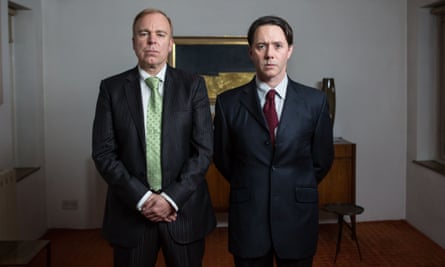
Let’s put it starkly: this is one of the greatest television series ever made. A horror-comedy anthology where each half-hour introduces fresh characters in a new confined, accursed space (a house, a room, a car, a cabin) – the eponymous No 9. It’s an immensely rare example of imagination and craft interacting at the highest level.
In a feat that would be impressive for a show with a large roster of writers and actors, Reece Shearsmith and Steve Pemberton – two of The League of Gentlemen – have come up with 31 diabolical ideas for episodes on their own, written and starred in every instalment, and shown the skill to execute their schemes, with hardly a dud among them. Fans expect the impossible: an arresting set-up with quickly established characters, into which bursts something awful that, in the last moments, is revealed not to be as it first appeared. Thus the last two minutes of an Inside No 9 episode has become the giddiest thrill on TV, with the best twists echoing in the mind for hours after the end credits have rolled and Newsnight has come on instead. For the first-time binger, it’s a potentially overwhelming assault. Repeat viewers can marvel at how obvious the clues that were missed seem in retrospect.
Not that Inside No 9 is merely a game, a trick, a cold technical exercise. Its most horrific moments are viscerally nasty, and the fact that Shearsmith and Pemberton are only ever a cocked hip away from characters in a Victoria Wood sketch means its laughs are earthy, often filthy and always unmistakably (northern) English. It has a deep soul, too: at its very best it is hauntingly sad – as with the superlative 12 Days of Christine – with all that macabre strangeness and bleak humour used to unlock a protagonist’s pain, shame or turmoil.
Shearsmith and Pemberton aren’t just masters of the television craft, either – some of Inside No 9’s standout tales show a profound love for the history of the medium and a desire to go much further than just very good storytelling. There’s a special joy in episodes such as The Devil of Christmas, a mocked-up 70s TV show shot with 70s equipment, or A Quiet Night In and its silent comedy, or Dead Line, an episode recorded live that … well, best to go in knowing nothing, but just imagine if you had been there on the night.
Inside No 9 is also one of the most Top 5-able shows ever. I’ll start: 1 The 12 Days of Christine; 2 Diddle Diddle Dumpling; 3 Bernie Clifton’s Dressing Room; 4 Love’s Great Adventure; 5 The Riddle of the Sphinx. Yours? Jack Seale
3
Love Is Blind
Netflix
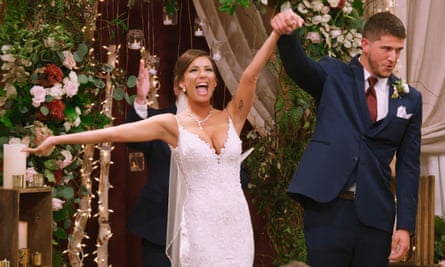
You could be forgiven for thinking that television had done all that it could do with matchmaking. We’ve moved through several eras of dating – Blind, Dinner, First – into high-concept series involving activities and/or a fuse for drama that is just waiting to be lit. Viewers who like to go deep into this subject will remember Married at First Sight, the Channel 4 series that introduced couples to each other at the altar, just before they took their vows and then followed them – complete strangers who made a lifelong commitment to each other based on not much more than a questionnaire and somehow ended up not getting along very well.
Netflix saw this and thought: hold my beer. Love Is Blind still marries two relative strangers to each other (if they choose to go through with it), but it maintains its sense of romance by insisting that they get to know each other first. And how! It goes through several stages, but in the first, participants (contestants?) live together in a house that is what the Love Island villa might look like, if it existed in the film Ex Machina. They go on a series of dates. In an attempt to prove the notion that looks don’t matter, all of these ostensibly very attractive people have to talk through a door. If they fall in love, then it is based on conversation alone. It is an astonishing lesson in the very different lengths to which men and women have to go to be considered impressive.
Those who find a mate go to a hotel for a weird post-seeing-each-other honeymoon-holiday, then they live together, then, because they are doing everything else arse-backwards, they have a wedding ceremony, during which there is absolutely no guarantee that the other person will say yes. It is jaw-dropping, is-this-really-happening television from start to finish. It makes you feel bad about watching it, while also making it impossible to stop. Naturally, it has been a huge hit, spawning countless thinkpieces on what it says about modern love and connection. On the plus side, if social distancing really starts to bite, it does leave you with the hope that love can happen for anyone, even through a wall. Rebecca Nicholson
4
Nighty Night
BBC iPlayer
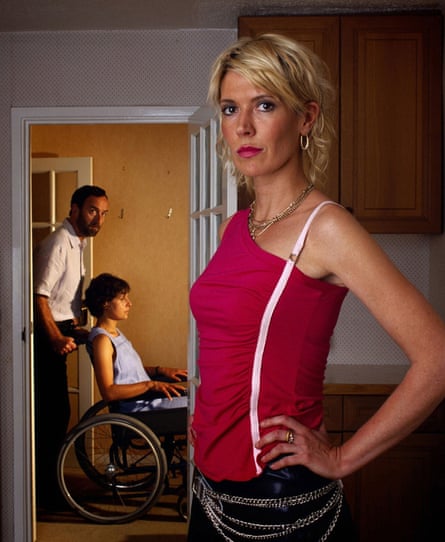
If the words: “Hiya Cathy! A cappuccino would be nice” take you back to a more simple time, then rejoice, because the grotesque genius that is Julia Davis’s Nighty Night is ready to be binged by anyone with a TV licence. Both seasons are available, which means you can get the full force of beautician Jill Tyrell’s plotting, from the moment she tells the world that her husband is dead (he’s not, but she convinces him his tumour is so big it has “gone off the side of the X-ray”) to her determined attempts to seduce other men. Well, who deserves to find lust again more than this “slim, vibrant lady in her mid-20s with a lust for life and a flexible spine”?
Nighty Night’s brilliance is driven by Davis’s determination to push the horrific comedy to any length. Nothing is off limits, whether that’s terminal illness, the seduction of a minor or smashed prawns in a milky basket. The mistress of mind games, Tyrell wears crotchless pants to “feel the wind beneath her wings” and plies her neighbour Don (Angus Deayton) with her meaty cushions while his multiple-sclerosis-stricken wife, Cath (Rebecca Front), is stranded outside in her wheelchair. By mistake, of course, because Tyrell is the ultimate gaslighter. She’s the kind of woman who is not afraid to bribe the health and safety inspector with a bold promise: “Joy will do anything for this salon, and bear in mind she can remove her dentures.”
Yes, it’s not comedy for the faint-hearted, but it dates back to 2004, a time when Mrs Brown’s Boys were just a twinkle in her eye and TV was free to be a bit more, well, cruel. Tyrell has no moral compass, so is comfortable riding into her husband’s faux funeral on a horse to a soundtrack of Heart’s Alone or seducing Don and Cath’s 12-year-old son.
Although Davis’s is the most outstanding (and astounding) character here, she’s joined by so many greats: Ruth Jones as Lin-der the goth beautician; Felicity “Lynn from Alan Partridge” Montagu as the proud-nippled vicar’s wife; and Mark Gatiss as Jill’s twitchy lover Glenn Bulb. Davis goes to places so dark only she could imagine them and if you can stop hiding behind the cushion for long enough to join in the bleak hilarity, she will take you there too. In a caravan. Hannah Verdier
5
The Wire
Amazon
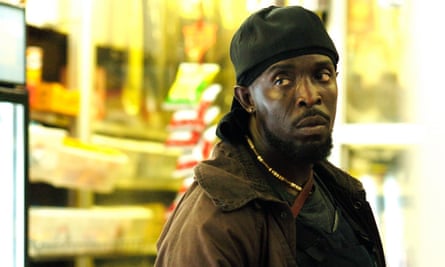
It was among the wave of shows that launched the concept of the binge-watch, but still, nobody has done it better. How many of those small-screen epics are truly worth revisiting? The Wire demands it. Not just because of its dimensions, the brilliantly crafted and realised characters or the resonance of its stories. But because The Wire helps explain modern America.
Barack Obama loved The Wire. He even had a very unpresidential favourite character: stick-up merchant Omar Little (Michael K Williams). But think of the betrayed stevedores in season two. Would that impotent outrage have helped Hillary Clinton follow Obama into the White House? Or would those furious votes have gone the way of Donald Trump? In season two of The Wire, it’s possible to see a shift beginning to take place as traditional modes of working-class political expression falter.
Think of the “fake news” storyline of season five. How normalised the behaviour of the unscrupulous hack Scott Templeton seems now. Think of the press conferences in which cops posed proudly in front of tables piled high with drugs and guns. This was a drama about a world in which presenting narratives of success was more important than success itself. Remember the corner kids, battered by the Baltimore cops. This show dramatised the violence and dysfunction that led to the Black Lives Matter movement. In each of these examples, The Wire is a roadmap. This is how we got here.
But if The Wire is a history lesson, it remains a ferociously entertaining and emotionally involving one. For all the analytical weight the show can bear, it always remained startlingly human. On all sides of the endless war of attrition at the heart of the show, David Simon and Ed Burns created characters who, for all of their often unforgivable flaws, remained deeply likable. They showed us that the drug kingpins, the murder detectives, the dope fiends and the hoppers on the corners shared one thing. They were all meat for the grinder; victims of the rigged game.
This, in the end, is the true genius of The Wire. It’s an achievement that, for all the considerable worth of Simon’s later projects, he has never quite repeated. And actually, the lesser success of his subsequent shows serves to illuminate The Wire’s uncanny brilliance. Its combination of narrative complexity, sociopolitical heft and thrilling, moving and occasionally hilarious human drama was a once-in-a-lifetime achievement. All the pieces really did matter. And they still do. Phil Harrison
6
You
Netflix
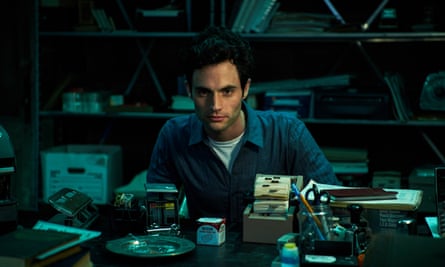
Everything that happens in this creepy thriller could have been avoided by the object of the stalker’s attraction closing her curtains. Picture the scene: Joe, a boyband-hot bookshop employee, seems like the perfect man, but hides a whole load of secrets under his foppish fringe. In a genius casting move, he’s played by Penn Badgley, the most lovable of Gossip Girl’s ensemble cast. What’s not to trust about Badgley’s face? Apart from the fact that he stares for a little too long and would imprison you in a glass cage as soon as look at you.
Joe’s chosen victim in the superior first season is the perma-annoying Guinevere Beck. She’s all tight vests, downward dogs and impossibly perfect beachy hair, but you could guess her Instagram password in three tries. OK, she’s not the first woman to fall under Joe’s spell, but she plays right into the hands of her stalker, and not just with her ridiculous refusal to shut the aforementioned blinds. Really, Joe could shut that bookshop and make a living out of standing outside her window and staring while she showers/shags/shifts her furniture around.
You was born out of the golden era of Netflix gloss (see also What/If, in which Renée Zellweger took her performance right down to cougar town, with beautifully trashy results). “Soapy” doesn’t begin to cover it. Season one is the escapist jewel in the crown. New York is a softly lit theme park with loft apartments, bookshops where lovers’ eyes meet over first editions, and vegan snacks. There are moments when Joe and Beck (yes, she goes by her surname) have the perfect romance. The kind that’s always teetering on the brink of being blown apart by some terrible event. Oh, and there’s murder too. If there’s one life lesson here, it’s never date anyone more intelligent or pretentious than yourself.
Season two has Joe reborn in LA with a massive twist. Even if you nap through it, you’ll still have received high drama and an improbable storyline by osmosis. Some might say it’s terrible, but there’s a masochistic pleasure to be gained from seeing it through to the end. Until season three arrives, that is … Hannah Verdier
7
The Staircase
Netflix

So, did he do it? The Staircase – which was originally shown in 2004 before releasing new episodes in 2013 and then, as it moved to Netflix, in 2018 – more or less invented the modern true-crime documentary, while clinging on to a crucial nuance that sets it apart from virtually every show that followed it.
Usually this type of show either encourages us to think that the documentary’s main subject did it, or to become outraged at the prospect of an innocent party behind bars. But in The Staircase, the answer to whether Michael Peterson killed his wife, Kathleen, in Durham, North Carolina, in December 2001 stays forever out of reach. The truth hovers above a mass of twists and fine details that are, as is common now but wasn’t when French director Jean-Xavier de Lestrade embarked on the project, doled out according to the rhythms and structure of a fictional thriller. Even the question of Peterson’s culpability ends up receding a little, obscured by something else that would become a trope of true crime: an exposé of the flaws and quirks of a legal system that makes an announcement as to the defendant’s guilt without really determining it to anyone’s satisfaction.
Another now-familiar theme is how this never-ending hunt for closure means the impact of a serious crime, rippling as a murder does through the lives of those left behind, is extended and worsened. But the boldest move The Staircase makes is in recognising how farcical the process is and allowing itself to be funny. Scenes filmed in offices and courtrooms filled with Peterson’s expensive but somehow schmucky legal team are persistently chock full of inappropriate gags and hilariously bad early-noughties clothes. Who took this woman’s life? America’s best effort at finding out is a game, a joke.
The later episodes in particular, though, focus back on the question of exactly what sort of man Peterson is. Certainly he’s not fazed, and perhaps even actively delighted, at appearing on camera. Every true-crime documentary hopes it will find a protagonist as intriguing as the case itself, and there’s never been a more sinfully alluring leading man than Michael Peterson. Did he do it? You’ll feel guilty for enjoying the not knowing as much as you do. Jack Seale
8
Succession
Purchase on iTunes/Amazon

Is Succession about the Murdochs? Or the Maxwells? Or perhaps the Waltons (as in Walmart not as in John-Boy)? Time spent speculating on the real-life models for this family of media moguls is time wasted, when we could be appreciating the show’s many on-screen pleasures instead.
Jesse Armstrong’s exploration of the neuroses of the super-rich could hardly be more relevant in 2020, but there’s also something timelessly Shakespearean about the Roy family dynamic. Logan Roy (Brian Cox) is Succession’s King Lear, an octogenarian with a leonine growl whose failing health only seems to tighten his grip on family business, Waystar Royco. From the very first episode of season one, he’s teetering on the bring of retirement – or oblivion, as he would see it – but who will take his place? Each of his four children feels they have a claim, and they’re compelled by emotional forces they barely understand to compete for his approval.
This sibling rivalry between Con (Alan Ruck), Kendall (Jeremy Strong), Roman (Kieran Culkin) and Shiv (Sarah Snook) usually takes the form in boardroom backstabbing or venomous volleys of creative insults (remember, Armstrong sharpened his dialogue skills on The Thick of It) but there’s real human pathos here too. Kendall, in particular, is always excruciating to watch. At first, it’s because he’s so repugnant – the way he raps along to the stereo in his chauffeur-driven car en route to a big-money business meeting, for instance. Then, later in the series, it’s because he’s so pathetic. Logan Roy breaks his children’s spirits with all the ruthlessness of a gulag guard.
Then we get to the Roy family’s outer circle, which includes Logan’s dark-horse third wife Marcia (Hiam Abbass) and son-in-law Tom Wamsgans (a career-best performance from the ever-excellent Matthew Macfadyen). Tom’s workplace bullying of gangly interloper Cousin Greg (Nicholas Braun) is often a source of comic relief but, as with any Succession scene, the tone can shift in an instant.
Any single episode is enough to appraise you of the noteworthy locations, elegant costume design, great dialogue or that incredible theme music by the Academy Award-nominated composer Nicholas Britell. To appreciate Succession’s greatest triumph, however, the way it makes you care about the most unlikable characters, you really have to see the whole thing from beginning to end. It’s a kind of sorcery. Ellen E Jones
9
Louis Theroux’s Weird Weekends
Netflix
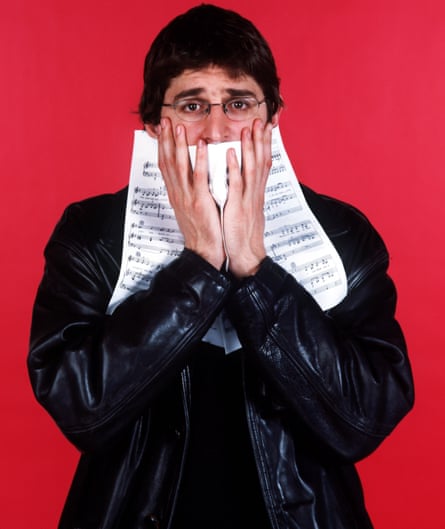
Nowadays, Louis Theroux is part-man, part-meme: the documentarian’s awkward charm and distinctively gawky silhouette has birthed ironic T-shirts, reaction gifs, a popular “no-context” Twitter account and a slew of other internet jokes. Yet Theroux began making his trademark fish-out-of-water films before many of his Gen Z stans had even been born. Weird Weekends, which aired on BBC2 between 1998 to 2000, saw Theroux get to grips with some of the US’s most unusual residents, from swingers and wrestlers to infomercial hosts and survivalist preppers (who don’t look quite so kooky now).
In the late 90s, Theroux was living in the US, presenting segments on Michael Moore’s comedy-news show TV Nation. Weird Weekends expanded on the latter’s portrayal of him as the quintessential British geek marooned in a society so unfamiliar he might as well have been from a different planet. As the title suggests, these are neither righteous nor intellectually rigorous documentaries – but Weird Weekends isn’t point-and-laugh-grade telly either. Instead, it most closely resembles a slightly surreal sitcom, with Theroux the only recurring cast member. And it was one that established its star as a beloved British TV character: archetypically reserved, thoughtful and droll, but never stuck up.
Theroux’s always game enough to get stuck in, whether the task is performing a rap song on the radio or playing a park ranger in a porn movie. Cringily comedic, Weird Weekends has more in common with The Office than Panorama, but as with all Theroux’s documentaries, there’s a layer of compassion that gives these shows emotional depth. The laughs are always split democratically between our slightly odd guide and his marginally odder hosts.
In recent years, Theroux documentaries are more likely to have you in cold sweats than fits of giggles. Once Weird Weekends had run its course, the filmmaker embarked on a series of celebrity interviews titled When Louis Met …, now infamous for an episode that naively chronicled the life of Jimmy Savile. His BBC Two specials followed, seeing Theroux pivot from dispatches from the outer corners of normality to disturbing subjects that mainly related to crime and mental illness – even revisiting his time with Savile, and the guilt he feels for not challenging him more. Weird Weekends may be far fluffier than Theroux’s later work, but the show is still essentially a thoughtful and humane interrogation of why people do the things they do – a subject that, unlike a cheesy Theroux-themed sweatshirt, will never go out of fashion. Rachel Aroesti
10
Line of Duty
BBC iPlayer

Jed Mercurio’s police procedural only started producing weekly water-cooler moments during its fourth season. A Hollywood-grade lead (in the form of Thandie Newton) and a shift from BBC Two to One doubled the show’s viewership, and AC-12’s mysterious and (presumably) righteous shenanigans began dominating the national conversation like few shows before or since. Yet if you only jumped on the Line of Duty bandwagon in 2017, you are in for a treat: the first three lesser-watched series of the cop thriller comprise some of the cleverest and most compelling television this country has produced.
Centring on the increasingly unsavoury actions of DCI Tony Gates (Lennie James), series one began building the complex foundations of the Line of Duty universe, introducing the three pillars of anti-corruption unit 12: undercover officer DC Kate Fleming (Vicky McClure), Martin Compston’s DS Steve Arnott and, of course, big boss DCI Ted Hastings (AKA unlikely heartthrob Adrian Dunbar). Dark, disturbing and, eventually, devastating, the first series suggested this was no run-of-the-mill crime drama. But it was with its second outing, featuring Keeley Hawes in the performance of her career as the dowdy and progressively mind-bending DI Lindsay Denton, that the show really found its feet. Over a spine-tingling two-season arc, the trio investigate exactly what Denton did and, more to the point, why; the narrative rolls along at pace, while remaining absolutely impossible to second-guess. It’s also the juncture where the loyalty and integrity of the unit starts coming into question – a conundrum that would soon help power the series into ubiquity.
Which brings us to the show’s latter two seasons. Newton’s DCI Roz Huntley and her nightmarish hand wound helped amp up the drama while codifying the show’s tropes. They included Mercurio’s fondness for killing off big-name actors early on, Hasting’s array of beguiling catchphrases (personal favourite: “I didn’t float up the Lagan in a bubble!”), and the recurring insistence that, where police corruption was concerned, the rot went all the way to the top. The hair-raising finale set up the subsequent, and most recent, series as must-see TV, with questions about the motives of Hastings in particular forcing obsessives to dig deep into the show’s archives to look for clues. The truth, of course, is that nobody knows where Line Of Duty is going (perhaps not even Mercurio himself), but if you put the hours in, this murky, adrenaline-fuelled drama will keep you glued to your sofa. Rachel Aroesti
11
Lost
AmazonPrime Video
Whenever I talk to people about Lost, which is all the time, people tell me that they never got around to finishing the series. Well, guess what? You are out of excuses. Start watching Lost straight away. Watch the early seasons, where it was a tightly wound mystery series starring a small band of compelling characters. Watch the middle bit, where the show treaded water with episodes that had no larger bearing on the overall series. Watch the end, where the wheels came off and it turned into a genuinely absurd sci-fi about time travel and nuclear explosions. Then watch the finale, and tell me that you didn’t enjoy it. Stuart Heritage
12
Our Friends in the North
Britbox
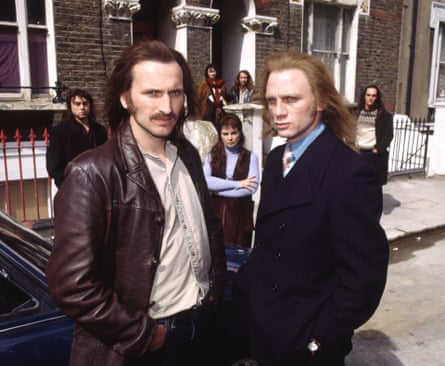
This is regularly lauded as one of the finest serial dramas in TV history. Plenty of shows have tried to do what this one did, but none have come close. Beginning in 1964, Peter Flannery’s series follows four friends (sublimely played by Christopher Eccleston, Gina McKee, Daniel Craig and Mark Strong) as they navigate lives in the context of the British political upheavals of the late 20th century. But while their personal dramas are punctuated by the economic crises of the 70s, the dawning of Thatcher in 1979 and the miners’ strike of the mid-80s, the political elements never feel heavy-handed. Instead, they feel like functions of the individual personalities, part of the accumulation of their lived experiences, their hopes and dreams. The politics matter. But not as much as the people. Phil Harrison
13
The Keepers
Netflix

This devastating docu-series is not an obvious binge, with its themes of murder, sexual abuse and a potential decades-long coverup by the Catholic church. However, its hugely intimate portraits of a group of retired women hunting for justice for their former schoolteacher is completely absorbing. Over seven episodes, we discover the rumours and suspicions that abound regarding Sister Cathy Cesnik’s disappearance in Baltimore in 1969. The bravery that the women display, combined with the chilling nature of the case and the care in its presentation – devoid of voyeurism – combine to make something that is extraordinarily moving and troubling. Unlike so many other true-crime tales, this is one series where its victims are treated as people. Hannah J Davies
14
Parks and Recreation
Sky/Now TV; Amazon
What better way to spend your time at home than watching a set of people going out of their way to help each other and improve their community? Focusing on local government workers in the fictional town of Pawnee, Indiana, Parks and Rec (as it is known by fans) began as a kind of faux documentary, an Office rip-off – but swiftly developed into so much more. It is the sheer, radiant positivity of its main character, Leslie Knope (Amy Poehler), that enables the ensemble of quirky, likable faces to shine. It is also funny as hell, launching the careers of Chris Pratt (nearly unrecognisable from the action hero he has become), Aubrey Plaza and Nick Offerman. Scott Bryan
15
Mad Men
Netflix
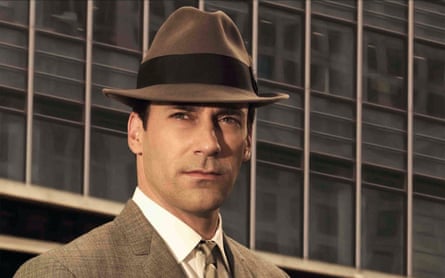
Remember the 00s, when we smoked in the office, wore sleek double-breasted suits and were constantly half-cut after downing a bottle of bourbon before lunch? No, wait, that was TV – when half the world was caught up in Mad Men fever and the abusive, adulterous, drunkard Don Draper (Jon Hamm in a career-best performance) somehow became the man every woman wanted to bed and the lothario every man wanted to be. This slice of mid-century nostalgia set in the advertising industry perhaps has not retained the same sense of awe as other TV greats of that era – but it is littered with acting talent (Elisabeth Moss! John Slattery! Christina Hendricks!) and, in his examination of Draper’s descent, Matthew Weiner wrote one of the most fascinating character studies ever put to screen. The clothes are fabulous, too. Toby Moses
16
Seinfeld
All4
Along with The Simpsons, Seinfeld is patient zero of modern comedy. If you were to watch it for the first time now, you might not get a sense of how revolutionary it was at the time, but that is because every other comedy made in the past two decades has absorbed its sensibility. Even if you have not seen it, you talk the way you talk because of Seinfeld. In one sense, bingeing Seinfeld in 2020 is an act of historical exploration. Then again, it remains one of the funniest shows ever made. Watch the shaky beginning, before it perfected its tone. Watch the locomotive years, when nothing else on television could touch it. It is just a shame about the finale. Stuart Heritage
17
The Office (UK)
Netflix
Sure, Ricky Gervais now spends his days making sub-par jokes about how the world has gone PC mad and only he – a very wealthy, successful comedian – can see the light, but the world has much to thank him for. Not least The Office, a titan of a mockumentary, which plumbed new depths of cringe. As David Brent, Gervais was a trailblazer of the self-obsessed, megalomaniacal boss before such people ended up on reality TV (see: The Apprentice) and even running the world. As a progenitor of the sadcom that has, from Fleabag to Transparent, dominated TV ever since, in many ways The Office is one of the saddest shows you can watch. But it is also a total joy to behold – especially those Christmas specials. Hannah J Davies
18
Call My Agent
Netflix
Buckle in for a riot of showbiz ego in this French comedy about the disastrous personal lives and glittering careers of the staff of one of Paris’s leading talent agencies. As they struggle to keep afloat amid various financial and creative crises, the agents veer through personal melodramas from ill-advised trysts to infidelities, paternity tests and even – if you stick with it – a birth on the office floor. Such is the show’s genius, and genuine adoration for the art of film, that many stars – even Juliette Binoche – play themselves in it. An additional bonus is that it is a great way to brush up on your rusty French. I started dreaming in French after ploughing through all three series in a matter of days. Jenny Stevens
19
The People vs OJ Simpson
Netflix
Ryan Murphy had already established himself as the king of the anthology series with American Horror Story by the time this strand of the series, American Crime Story, rolled around. His shows worked on a brilliant formula – hire a bunch of actors too tremendous to agree to multiple seasons, tell a single story and then get out again. With The People vs OJ Simpson, the formula hit paydirt. Cuba Gooding Jr was electric as Simpson; John Travolta was an excellent Robert Shapiro; and David Schwimmer was a surprisingly convincing Robert Kardashian. Its greatest trick, though, was how it walked the line between journalism and flashy exploitation with such incredible ease. This is the perfect way to set yourself up for Impeachment, the American Crime Story series about the Clinton/Lewinsky affair, coming whenever we are allowed out of the house again. Stuart Heritage
20
Happy Valley
Netflix
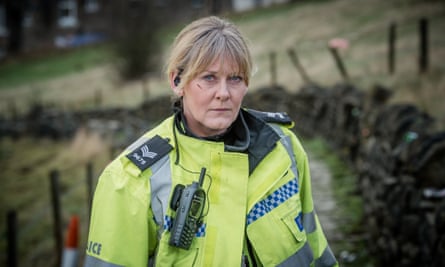
Sally Wainwright’s pitch-black police drama puts Sarah Lancashire front and centre – which is always a good thing. She excels as a plain-speaking sergeant, grieving over the suicide of her daughter while patrolling her West Yorkshire town – a hotspot of rape, murder and drug dealing. It had a star-making turn from James Norton, now one of the favourites to be the next Bond, but here playing a thoroughly nasty piece of work. It is certainly not an easy watch, and Lancashire’s brutal assault in the first series leaves its mark – on both the character and the viewer – but there are few British dramas of the past decade than can match this. Toby Moses
21
The Killing
Available to buy on Amazon
Here is the original Scandi drama, or “Nordic noir”, for anyone still wondering what all the fuss was about. Copenhagen-based detective inspector Sarah Lund (Sofie Gråbøl) is finishing her final days on the job before joining her fiance in Sweden, when a 19-year-old woman is found raped and murdered. Lund delays her transfer and gets to work, eventually teaming up with her replacement, Jan Meyer (Søren Malling), for an investigation that moves slowly by comparison with traditional case-of-the-week crime dramas. Each episode represents 24 hours of police work, but the series also explores a family’s grief and political corruption to gripping effect. You will come for the famous knitwear, but stay for the peerless storytelling. Ellen E Jones
22
This Life
BritBox
The upbeat and moving account of a group of budding lawyers living in a houseshare just south of the Thames in London was recently fondly re-appreciated when it arrived on BBC iPlayer earlier this year, and can now be streamed on BritBox. Although at first it looks quite different from the precarious lives of today’s twentysomethings, themes of entering the world of work, figuring out who you are and getting trashed still resonate. As do the lovably flawed characters, particularly Anna (Daniela Nardini) and Miles (Jack Davenport). The sexual tension is so electrifying it is amazing that the house did not burn down. A backdrop of 90s club culture (most memorably when Anna takes Egg’s dad clubbing) and a soundtrack deeply ingrained in the era only adds to the nostalgia. Sarah Phillips
23
End of the F**king World
All4; Netflix
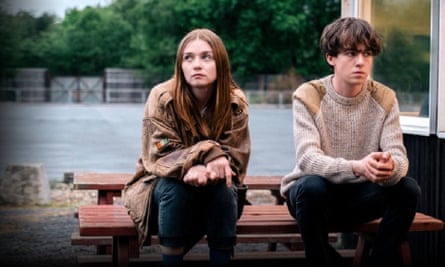
This may sound a little too close to home, given current events, but the joy in Charlie Covell’s graphic novel adaptation is how it spins away from its dark premise and your initial expectations towards a modern, youthful take on Bonnie and Clyde. Student and social outcast James (Alex Lawther) is convinced that he is a psychopath with a hunger to kill, setting his sights on fellow oddball Alyssa (Jessica Barden). It may not seem like the ideal start point for a touching romance, but the road trip that ensues offers a tender and thought-provoking exploration of adolescence, a rallying cry for anyone who has ever felt like an outsider. Its minimalist style and stark, western-inspired visuals are immediately striking – but the sparkling dialogue is what will keep you coming back. The response of Alyssa to a shopkeeper who is dissatisfied with his life stays with me to this day: “Then do something.” Scott Bryan
24
Search Party
All4
Best known as Arrested Development’s plucky Maeby, Alia Shawkat came into her own in this full-throttle black comedy about a young woman who goes missing and the egotistical Brooklynites who have to find her (among them, the dangerously narcissistic Elliott (John Early) and Portia (Meredith Hagner), who is entirely devoid of self-awareness. While the first run is a perfect, self-contained whodunnit, a couple of huge twists allowed it to stretch into a second series, with another on the way. A show that is as scary as it is entirely ludicrous (watch out for the cult operating from under a luxe jewellery store), Search Party has a way of hooking you in, even if, invariably, you will end up in a love/hate relationship with its central clique and Shawkat’s backbone-free Dory. Hannah J Davies
25
The L Word
Available to buy on Amazon
Once upon a time, a same-sex storyline on a TV show was such a rarity that even a hint of gayish subtext was enough to guarantee a queer audience. These days, it does not feel like the unicorn rarity it once did. In part, that is thanks to The L Word, which arrived in 2004 (and was recently rebooted). Elements of this brilliantly soapy saga have aged about as well as you would expect of a show that asked questions about gender and sexuality more than 15 years ago, but it remains a total hoot, offering high-stakes drama with a campy flair that becomes more pronounced as it progresses. You can have a ball just wondering exactly how any key character’s personality is going to be dramatically overhauled from one season to the next. Rebecca Nicholson
26
The Royle Family
Netflix
What you need now, more than anything, is warmth. And The Royle Family has warmth in spades. This is a show so warm that, in one episode, two adults sing No Surprises by Radiohead to a sleeping baby and it seems like the most tender act in all of history. Let The Royle Family act as your surrogate family in the coming weeks. A bunch of familiar faces, sitting on well-worn sofas, aimlessly trading affectionate insults for half an hour at a time sounds like an absolute balm at the minute. This is comfort TV at its most comfortable. Stuart Heritage
27
Catastrophe
All4
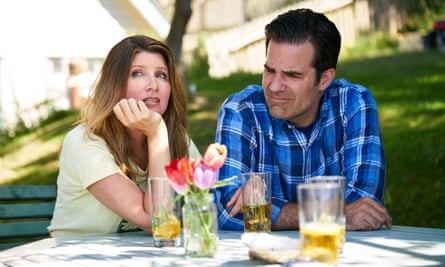
A raucously funny romantic comedy for grownups. Over four snappy seasons, Sharon Horgan and Rob Delaney depict how messy relationships can be with unflinching honesty. The show follows the romance between a middle-aged couple played by the co-creators. What starts as a holiday fling moves into a long-term relationship when Horgan gets pregnant. What follows is a poignant, hilarious look at the difficulties facing all couples. Each episode is crammed with brilliantly filthy and at times downright savage one-liners that get to the heart of sex, marriage, parenthood and the sheer hard work it takes to stay in love, especially when life and all its troubles get in the way. This is a believable love story between two very likable but flawed individuals portrayed with warmth and acidic charm. Ann Lee
28
Better Things
BBC iPlayer
Although she has been in showbiz since childhood, Pamela Adlon was once best known for her Louis CK collaborations (she played a love interest on his sitcom, Louie, and he co-wrote Better Things’ first season). But while Louis CK’s reputation took a #MeToo-related dive (Adlon described his behaviour as “abhorrent”), her star has continued her rise. She stars here as Sam Fox, a working actress and single mother to three teenage daughters, living in a languid, sometimes dreamlike Los Angeles. Sure, everyone has their own semi-autobiographical comedy-drama these days, but Better Things has undersold itself. This is the best of all possible things: a feminist Curb Your Enthusiasm with more heart – and more womb – than all the other pretenders put together. Ellen E Jones
29
Queer as Folk
All4
The word “iconic” is too often thrown around, but never has it felt more apt than to describe Queer as Folk. The series did not just introduce the British public to queerness; it confidently bludgeoned them with it – with the opening episode alone featuring underage sex, threesomes and rimming. Try explaining that to your mum. As well as being unapologetic, it was joyful, explicit – euphoric, even – in its depiction of queer (male) life. Written and created by Russell T Davies, it follows three gay men living and loving on Manchester’s gay scene. It launched the careers of Charlie Hunnam (now of sub-par Hollywood fare) and Aidan Gillen from The Wire and Game of Thrones, but more importantly it put gay sex on terrestrial TV – and for that a whole generation of teenage boys will be for ever grateful. Dylan B Jones
30
Friday Night Lights
Amazon

Based on the HG Bissinger book about Texan high-school football culture, the show begins with an accident that paralyses Dillon High’s star quarterback, Jason Street (Scott Porter). It is left to eager new coach Eric Taylor (Kyle Chandler) and his wife, Tami Taylor (Connie Britton), a guidance counsellor, to pick up the pieces, while handling other crises – from absent parents to addiction – that afflict the town’s teenagers. You need not like (or even understand) American football to enjoy the show; in no time at all, the wonderfully captured drama on the field will captivate you just as much as the drama off it. Through five seasons of agonising twists and turns – perhaps most dramatically with Tyra and Landry’s devastating storyline in the second (even if the ramifications were quickly brushed under the carpet) – the team’s motto burns brightly: “Clear eyes, full hearts, can’t lose.” Sarah Phillips
31
The Thick of It
Netflix/BBC iPlayer
You shouldn’t need an opportunity to rewatch The Thick of It. You could watch it a million times in a row and Armando Iannucci’s political satire would still maintain its bite. If you haven’t seen it since the altogether more slick Veep, you might be taken aback by how joyously ramshackle this cheap little no-risk BBC Four sitcom feels. But that is part of its charm. When Malcolm Tucker bares his teeth for the first time in the first scene of the first episode, it is like stumbling across a found-footage horror film. It’s nightmarish. You might not think now is a good time to watch a show about the incompetent failings of national government. But, if you have the stomach for it, there’s nothing better. Stuart Heritage
32
Queer Eye
Netflix

They’re here, they’re queer, and they’re about to get you a whole new wardrobe (and house!). The Queer Eye reboot – helmed by the fab five of Jonathan, Antoni, Karamo, Tan and Bobby – saw the 00s makeover show get a whole new lease of life, via questionable avocado recipes and incredible interior design. By focusing more closely on the inner struggles of its participants, helping people who had seemingly fallen through the cracks to regain their confidence, and rectify the areas which needed fixing in their lives – from broken relationships to coming out – it became “more than a makeover”. If the Japanese spinoff felt like overkill, there are still four other series to blitz through. Hannah J Davies
33
Twin Peaks
Sky/Now TV
Given what it was – a mystery show with no real intention of answering its own mystery, made by a figure who specialises in deliberately oblique storytelling – the original Twin Peaks was a blockbuster of a show, with an old-school riddle at its heart. A girl died. A good-hearted stranger comes to town to investigate. Then weirdness ensues. But, at least to my mind, the 2017 sequel has now become the definitive Twin Peaks. Aggressively avant garde in places, and truly terrifying in others, it is like nothing else that has ever been on television. It is not an easy watch by any means. In fact, sometimes it is downright maddening. But nevertheless, it will affect you in ways you didn’t think you could be affected. Stuart Heritage
34
Deadwood
Sky/Now TV
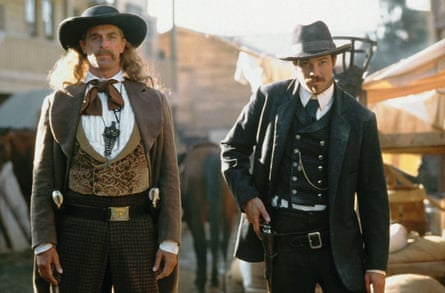
Ever wanted to see Lovejoy scream “cocksucker” at a procession of bemused cowboys? Then this is the show for you. Set in the “hey!”-day of the wild west, with a host of real-life historical figures such as Wyatt Earp and Calamity Jane popping in and out of its small South Dakota town, Deadwood’s stellar reputation never translated into viewing figures, leading to its premature cancellation after three seasons. Luckily, the storylines were rounded out in a feature-length special last year, making now the perfect time to appreciate this thoroughly modern western. Ian McShane chews the scenery as the saloon owner Al Swearengen, but it is Timothy Olyphant, playing the long-suffering sheriff, who holds it all together. If you are not hooked after the first four episodes, culminating in the depiction of the real-life murder of Wild Bill Hickok (an all-too-brief turn from Keith Carradine), there is something wrong with you. And if all else fails, just count the F-bombs; there are 43 in the first hour alone. Toby Moses
35
Arrested Development
Netflix
It may have been created for a pre-streaming world, but there are few sitcoms as binge-friendly as the Bluth family’s madcap saga. Stuffed to the gills with callbacks and inter-show references, Arrested Development benefits hugely from back-to-back (and repeat) viewing – and the impressive gag-rate and endlessly ridiculous narrative accelerations mean the episodes simply fly by. Masterminded by The Ellen Show co-creator Mitchell Hurwitz, Arrested Development began airing in 2003, with three near-peerless seasons before it was cancelled, only to be resurrected for two more disappointing outings on Netflix. Nonetheless, we will always have those early years tracing the many trials (sometimes literally) of the extremely rich, extremely entitled and extremely eccentric Newport Beach crew. Cue layers of cartoonish plotlines, catchphrases galore and a veritable labyrinth of addictively quotable in-jokes; not to mention some of greatest slapstick that television comedy has ever seen. Rachel Aroesti
36
Crazy Ex-Girlfriend
Netflix
A true millennial phenomenon. The idea of a feminist musical sitcom that majors on mental health issues might cause eyes to roll. But don’t switch over to Friends just yet. Crazy Ex-Girlfriend is hilarious, pioneering and eminently watchable. It has caused controversy since first being aired in 2015, chronicling the life struggles of its main character Rebecca (played wonderfully by its writer-creator Rachel Bloom) – from her obsessive fixations and borderline personality disorder, to suicide attempts and abortions – all with a sunny musical theatre soundtrack. What could be heavy, dramatic fare, is dealt with confidently, accompanied by a righteous wink; the Cats special is a thing to behold, and Period Sex will be stuck in your head for weeks. Bloom has been nominated for multiple Emmies, Glaad awards and Golden Globes for her performance, and rightly so – she shines. But the supporting cast are beautifully played, too, with one of the most authentic portrayals of bisexuality ever put to screen in Pete Gardner’s Darryl Whitefeather. Dylan B Jones
37
Next in Fashion
Netflix

All dressed up with nowhere to go? Then try Next in Fashion, the Netflix reality show in which already competent and semi-established designers, stuck in the shadows of their big-name bosses, get to compete in front of an impressive array of fashion insiders, from Christopher Kane to Phillip Lim. Better still, its focus on bringing people up rather than putting them down offers a welcome reprieve from the more typically brutal world of TV talent competitions, and presenters Alexa Chung and Tan France provide warm, supportive, well-tailored shoulders to cry on. Plus, you don’t have to wait 10 weeks to find out who the winner will be; the duo very much urge you to binge this, with a reminder to press “next episode” at the end of every episode. Rebecca Nicholson
38
Shameless
All4
Between 2004 and 2013 the writer Paul Abbott embedded us in Manchester’s Chatsworth council estate, with the sprawling, chaotic Gallagher family, headed up – nominally – by their drunkard dad Frank (David Threlfall) and, actually, by his eldest daughter Fiona (Anne-Marie Duff). So much good came from the Gallaghers: Fiona’s unutterably sweet on-screen romance with Steve led to the real-life marriage of Duff and co-star James McAvoy; Maxine Peake built her reputation as fearsome neighbour Veronica, and stories were told about British working-class life without condescension or judgment. Are the Gallaghers the type of family to have a coat of arms? Probably not. But if they were, its motto would read: “Honi soit qui mal y pense” – Shame on those who see shame in it. Ellen E Jones
39
First Dates
All4
Masterful matchmaking is what makes First Dates stand out. It sometimes feels like the only dating show on television with producers who actually care, as proven in a 2015 special episode First Dates: The Proposal, which welcomed back couples who had found love on the show and offered a second chance to those who had not. Not everyone who presents themselves at Fred the maître d’s famous check-in desk will find romance. But the 42 cameras placed around the restaurant mean we miss none of the tragic chat-up lines, awkward silences, tear-jerking backstories and uplifting moments. After a few episodes, even the most hardened cynic is guaranteed to find themselves whooping like the drunkest guest at a wedding. Ellen E Jones
40
Sex Education
Netflix
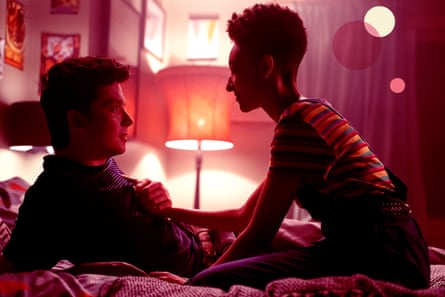
There are so many things about Sex Education that may irritate at first. Why does the school look so American – right down to the lettered bomber jackets – despite being set (and filmed) in rural Britain? For that matter, why film in Wales yet feature no one with a Welsh accent? And let’s not forget that hardy perennial: why do most of its teenagers look about 30? (Answer: because they are.) But be patient; get past that. The show may attempt to lure you in with Inbetweeners-style crudeness, but it unfolds into a thoughtful, well-paced comedy drama, with an almost public-service zeal for exploring the issues around sex and relationships with sensitivity and warmth. There is, of course, the show’s breakout star too, Ncuti Gatwa (real age 27). He has become a meme as lead character Otis’s out-and-proud gay best friend, Eric, and is now a rather unexpected spokesperson for the coronavirus pandemic, with his line after spotting another character leaving the toilets without washing their hands doing more to stop the spread of the virus than any Boris Johnson press conference: “Wash your hands, you detty pig.” Scott Bryan
41
The Blue Planet
iPlayer
There are few voices more soothing than David Attenborough’s, and here he narrates what must be one of the greatest nature documentaries of all time, and certainly the most visually stunning. While its 2017 sequel (also on iPlayer) played a vital role in shifting attitudes towards plastic pollution around the world, it started here, with the the original Blue Planet in 2001, which took five years to make and is still one of Attenborough’s career highlights. The sheer beauty of all that it uncovered is wonderfully escapist in itself (episode two, The Deep, is a psychedelic wonder), and at a pinch, it may also provide just a little of what’s needed in times like these: travel without travelling, education without crowds, and a reminder of the respect we must have for the unforgiving power of nature. Rebecca Nicholson
42
Noughts + Crosses
BBC iPlayer

Malorie Blackman’s hit young adult series arrived earlier this month, its tale of star-crossed lovers separated because of their races and backgrounds seeming more urgent as bigotry continues its worrying resurgence. Over six episodes – all of which are available to stream now – this Romeo and Juliet in a race-reversed society draws you into a world where the microagressions and discrimination frequently suffered by people of colour are drawn into sharp relief, and the lines between rich and poor are more pronounced than ever. Besides this, it is also a gripping tale of families with hidden secrets, changing allegiances and, of course, love. Peaky Blinders’ Jack Rowan and newcomer Masali Baduza are captivating as the leads, while Paterson Joseph is among its strong ensemble. Hannah J Davies
43
Modern Family
Sky Go/NowTV/Amazon Prime Video
Modern Family is a show you can bond with, settling into and going the distance with its 10 series. Those 200-plus episodes, along with the ongoing 11th and final series, make the story of various factions of the Pritchett clan – including a gay couple with a daughter, introduced to a mainstream American audience as part of the happy warp and weft of normal suburban life – one of the longest running sitcoms in television history. Of course there have been peaks and troughs in that time, but it has always been of standout quality, with laugh-a-line scenes, some of which are so light and fleet that you barely catch them skimming past you, making every episode ripe for rewatching. Lucy Mangan
44
Dirty John
Netflix

As podcasts become ever more popular, so the number of pods that have been made into TV series continues to grow, from Homecoming (Amazon Prime Video) to Limetown (Facebook Watch). Chief among them is Dirty John, adapted from the hit Wondery show about a devious, bedraggled conman who wormed his way into the life of a moneyed businesswoman, Debra Newell, by posing as a successful anaesthesiologist (he was in fact a former nurse anaesthetist who had spent time in prison for fraud). The total gall displayed by John Meehan – as he attempted a Parasite-esque takeover of Newell’s life – would be enough to stun most people. But, combined with a helping of Netflix melodrama, it makes for a particularly shocking, if knowingly cheesy, watch. Hannah J Davies
45
New Girl
Amazon Prime Video
This Zooey Deschanel vehicle has two main things going for it. First, it is funny. Second, there are a lot of episodes. I adopted New Girl as my back-up binge show a couple of years ago, dropping in and out when there wasn’t anything exciting on, and I still haven’t made it to the finale. The best thing about an ensemble sitcom such as New Girl is that – if you hang in there for long enough – all the characters have their time to shine. Schmidt is the breakout character, but then he is eclipsed by the ornery Nick. And then, out of nowhere, Winston becomes the absurdist one who holds the whole show together. This is a series so egalitarian that even Megan Fox is able to become its funniest thing for a decent stretch of episodes. Stuart Heritage
46
Years and Years
BBC iPlayer

Increasingly, you can just stroll down to your local supermarket to achieve an effect comparable to watching Russell T Davies’s 2019 future-shock family saga. With its grim projections about rampant populism, accelerating climate crisis, the madness of crowds and the bewildering pace of technological change, Years and Years felt worryingly on the nose when it aired last year. Suffice to say, its vision hasn’t got much more comforting in the meantime. But as horrifying – and frequently plausible – as the travails of the Lyons family were, the show does, eventually, speak to resilience and continuity. By the skin of their teeth, and not without a couple of casualties, the family keeps it together. And so, just about, does the country. Phil Harrison
47
Lovesick
Netflix
The sitcom previously known as Scrotal Recall was always far better than a show with that painful pun as a name had any right to be. But with a new moniker, and a shift to Netflix, fresh life was breathed into the tale of four twentysomethings navigating friendship, relationships and STIs post university. The laughs may be gentle, but the writing by Tom Edge is subtle and the characters well drawn, with Johnny Flynn (brother of Jerome) leading the cast as the chlamydia-infected Dylan tracking down his previous conquests to break the news. It’s a neat conceit, and the will they/won’t they romance with Antonia Thomas’s Evie is in the greatest of sitcom traditions – and far less frustrating when watched in one go. Toby Moses
48
Brooklyn Nine-Nine
All4
The cop comedy Brooklyn Nine-Nine is a feelgood proposition on every level. It is a properly funny comedy. It is undemanding moreish fare. It has charm, it has warmth, it has heart. Its characters are fundamentally united, chafing and rubbing together enough to strike comic sparks but essentially hanging together in the fight against the villainry. True antipathy or hostility has no place here. But best of all, and most valuably perhaps in our current times, it also shows every sign of the ensemble cast being free of it, too. It is impossible to know for sure, of course – the set may be a hotbed of hatred and warring egos – but one feels that the easy camaraderie on display is impossible to fake entirely. Add to that the joy of seeing Andre Braugher – Frank freaking Pembleton from Homicide: Life on the Streets, people! – in a light comic role and all that it left to say is, of course, NOICE! Lucy Mangan
49
Brideshead Revisited
Amazon Prime Video/BritBox
They don’t, in so many senses, make them like this any more. ITV’s 1981 version of Evelyn Waugh’s 1945 novel was, with its 11-hour running time, not far off granting the wish of those viewers who like dramatisations to include every word of the book. That meant the world Waugh conjured – fading nobility, eccentric inter-war hedonism and grassy afternoons at a perfectly proper Oxford University – could be allowed to completely envelop the viewer. In the days before the big US box-set beasts, Brideshead Revisited was routinely cited as the best TV show of all time. In part, that was due to the exquisite score, the sky-high production values and the brilliant cast. But its appeal has always been mainly as a door to a fantasy of a bygone world. That’s now perhaps more valuable than ever. Jack Seale
50
Fresh Meat
All4

Making a followup to Peep Show was always going to be tough for its writers Jesse Armstrong and Sam Bain, and shorn of the natural comedic chemistry of Mitchell and Webb you might find yourself wondering where all the laughs have gone. But this is not a sitcom – it sits in that weird half-space, not quite a drama, not quite a comedy – where so many TV shows flounder. Yet Fresh Meat pulls through with a hugely talented young cast bringing to life a collection of university misfits adjusting to house-sharing – and hinted at the drama chops of Armstrong, who would go on to write Succession without his long-time collaborator. Jack Whitehall impresses as the posh dimwit best avoided in the uni bar, while Zawe Ashton’s beautifully surreal turn as Vod never fails to entertain, even if the thrill is somewhat diminished in the latter series when the character is pushed to the emotional forefront. Across four series, we see the characters mature, regress and mature again – before it reaches its natural endpoint with graduation. Toby Moses
